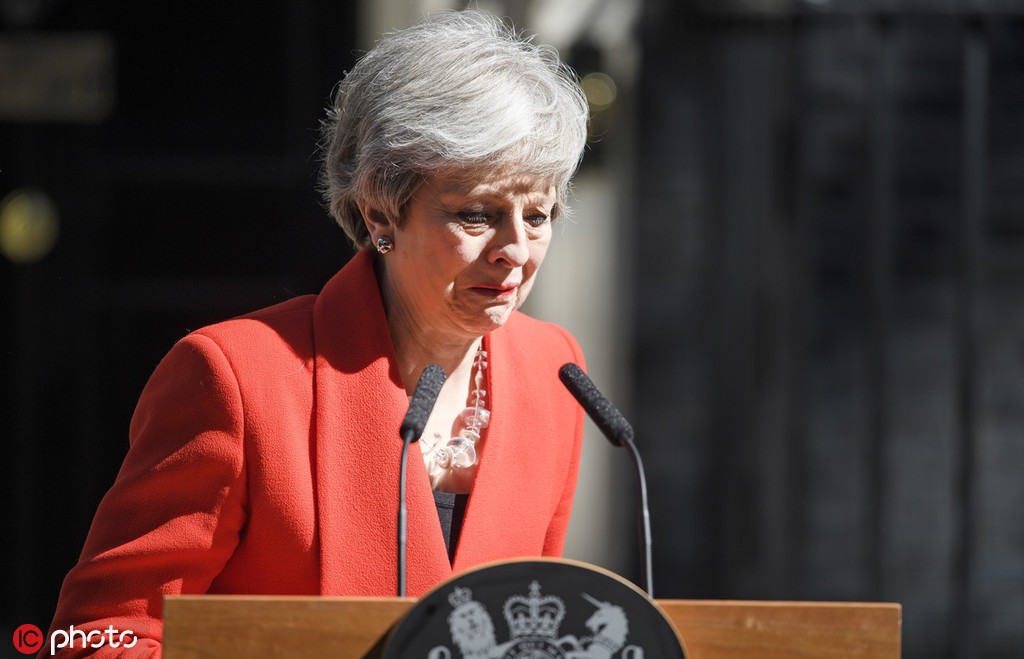Recent events highlight the UK's disarray
By JULIAN SHEA | China Daily Global | Updated: 2019-06-03 10:41

Webster's dictionary defines news as "a report of recent events; previously unknown information". The biggest news stories in British politics for the past two weeks certainly match the first definition, but are less clear on the second.
Those stories were Prime Minister Theresa May's resignation announcement on May 24, and the following week's European Parliament election results. They both qualify as recent events, but were more confirmation of something widely expected rather than previously unknown information.
The instant dismissal of May's 'new, bold' repackaging of her three-times rejected Brexit terms meant her departure was a case of when, not if. With a public holiday weekend ahead, and the prospect of what everyone knew would be a catastrophic Conservative European election result, wisely she chose sooner rather than later.
Her tears were barely dry before the race to succeed her began. The early contenders are largely strong Brexit advocates but Chancellor Philip Hammond has warned that a no-deal Brexit, which means leaving the European Union at the end of October with no alternative arrangements in place, will be unacceptable to the majority of Conservative members of Parliament. Whoever becomes the next leader could soon find themselves trapped in the same inescapable labyrinth that broke May's spirits.
If her departure was just a matter of time, then everyone knew exactly when the week's other big event would happen; on May 26 night, when voting across Europe ended.
As expected, the results were the stuff of Conservative nightmares. Their 9.1 percent of the vote was the party's worst electoral showing since 1832, but the opposition Labour Party fared little better, seeing its share slump to 14.1 percent. The 'big two' of British politics took a mauling as the full tectonic plate split caused by Brexit was exposed.
Nigel Farage's recently established Brexit Party was the night's headline-grabber, going from nothing to 29 seats, with 31.6 percent of the vote. But that 'zero to hero' success is slightly less miraculous than it appears, because in the 2014 European elections, the biggest winner was Farage's previous party, the United Kingdom Independence Party, known as UKIP, with 24 seats. Its 2014 success received almost identical headlines to the Brexit Party's five years later.
This time, having lost its leader and its ideological position to the newcomers, UKIP also lost all its seats. Additionally, the Brexit Party picked up five more, for a total of 29. Despite having not even published a manifesto explaining how it plans to achieve it, the party's message-Brexit-could not be clearer, and voters loved it. So far, Farage's relentless efforts have brought down two Conservative prime ministers, David Cameron and May. Soon, he will be gunning for a third.
Conversely, it was also a great night for Remain supporters. Explicitly anti-Brexit parties, led by the Liberal Democrats and supported by the likes of the Green Party and Scottish National Party, also scored extremely well. The Lib Dems, as they are known, ended up with just more than 20 percent of the vote and 15 seats, with the Greens managing 12.1 percent and seven seats.
Together, the assorted anti-Brexit parties polled 40.4 percent, ahead of the Brexit Party and UKIP, with a combined 34.9 percent.
After years of a two-party dominated system, Brexit has divided the British political landscape into two polar opposites, with one side dominated by the Brexit Party and the other shared by a huddle of smaller anti-Brexit parties. In the middle is a huge chasm down which the Conservatives and Labour fell on May 26.
The prospect of May's successor being a Brexit hardliner and increasing Conservative internal tensions to near-breaking point meant that before May 26 results, supporters of Labour and its leader Jeremy Corbyn were relishing the possibility of a government collapse and maybe a general election before the year's end.
But as results came in, the mood turned sour as the full extent of public dissatisfaction with Corbyn's own far-from-clear Brexit stance was demonstrated by the collapse of Labour's vote share. Labour now faces a fork in the Brexit road choice just as big as the one the Conservatives must make.
The Brexit Party and the anti-Brexit camp were both winners on Sunday. Undeniably, the Conservatives and Labour were the losers. On either side, what happens next is far from clear, but British politics is likely to become even more angry and divided before any way forward emerges. As for the final outcome, that is something that will definitely match the definition "previously unknown information".
























